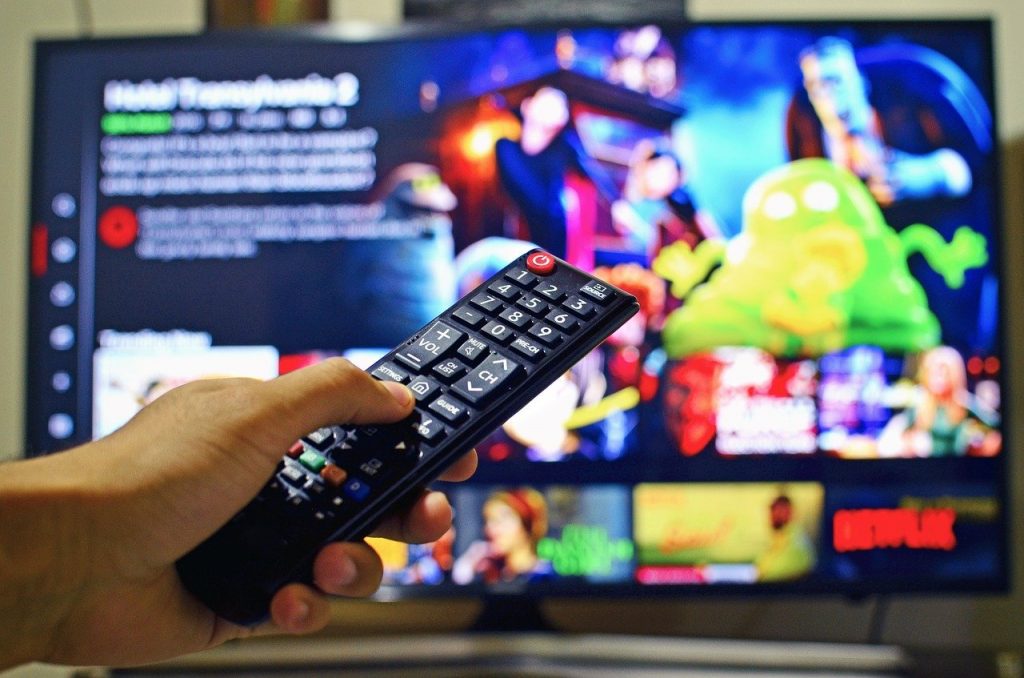The government propose to tighten regulations in the UK on streaming TV services like Netflix, Amazon Prime and Disney+.
Most streaming platforms do not have to comply with regulator Ofcom’s code in the same way as traditional broadcasters like the BBC and ITV. The regulations cover issues like harm, offence, accuracy and impartiality. The government are now reviewing whether the rules need strengthening.
According to figures from April 2020, viewers watched subscription streaming services for one hour 11 minutes per day. This is twice the amount than in the year before. In addition, two in five viewers said in 2019 that in five year’s time they would probably not watch any broadcast TV anymore at all.
Meanwhile, ministers are also consulting on the privatisation of Channel 4, which is publicly owned but funded by advertising.

‘Potentially harmful’
Currently, the only streaming TV platform that must adhere to Ofcom’s broadcasting code is BBC iPlayer. If they break the rules, the regulator can issue fines to the broadcaster and suspend licences.
Streaming services with head offices in the UK, including Amazon Prime and Disney+, have separate rules regulating incitement to hatred and other “harmful material”. But this does not apply to Netflix who is based in the Netherlands, so does not come under Ofcom’s jurisdiction. The streaming giant faced criticism last year for historical accuracies in scenes of its hit drama series The Crown.
However, some services do have their own voluntary procedures. This includes Netflix’s age ratings partnership with the British Board of Film Classification (BBFC). The government say this all results in an “inconsistent, ad-hoc and potentially harmful gap in regulation” at the moment.
Culture Secretary Oliver Dowden claims “technology has transformed broadcasting but the rules protecting viewers and helping our traditional channels compete are from an analogue age”. Now is the time to look into the potential of public service broadcasters, while ensuring people receiving content on new formats have a fair system that works.
A key thing the government is looking at is helping Channel 4 stay at the heart of British broadcasting. As well as ways to ensure fairness between broadcasters and video-on-demand services.
‘Public service before profit’
Channel 4 executives warn that privatisation could result in a focus on only making shows that are commercially appealing. Their current priority for programmes is “not about the bottom line”, they always “put public service before profit” in decisions. Priorities have to change when running a commercial business, so decisions are made differently, as shareholder returns need considering.
However, the government say privatisation “would better allow Channel 4 to compete and strengthen its role as a public service broadcaster” in a new age. The media landscape is “unrecognisable” from the near 40 years ago when the channel first launched.
They explain, “moving Channel 4 into private ownership could allow it to access new capital, create strategic partnerships, and reach international markets only available through the private sector”. Changing the model might also enable Channel 4 to diversify its income streams. They can then invest in new technology, and make fresh content and programmes.
The government also confirm new laws going ahead to make sure UK public service broadcasters have a prominent place on other platforms and devices.
Thank you for reading Streaming TV giants face tighter UK regulation

Looking for a storage solution for your garden furniture, tools and belongings? Look no further – Garden Sheds at affordable prices.